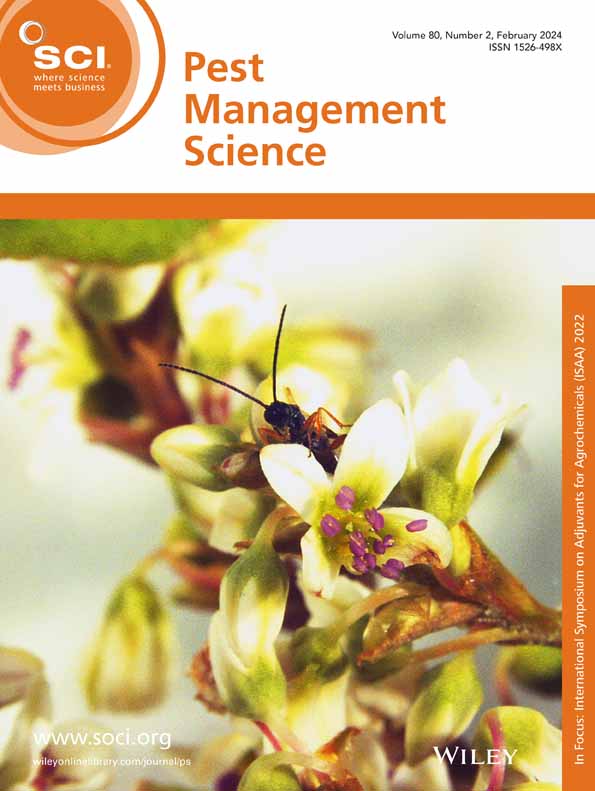微生物制剂通过调节土壤理化和微生物特性来抑制枣树黑斑病,提高枣树品质。
IF 3.8
1区 农林科学
Q1 AGRONOMY
引用次数: 0
摘要
枣树黑斑病是由枣树土源性病原菌交替孢霉引起的病害,影响枣树产量,威胁着枣树产业的可持续发展。然而,微生物制剂是否能通过改良土壤、抑制红枣黑斑病和调节微生物群落来提高产量,目前尚不清楚。结果velezensis菌株SDTB038对交替田鼠有显著的抑制作用,声场防治效果显著(两次施药后防治效果分别为39.71%和41.97%)。SDTB038具有良好的耐盐碱性,在含NaCl 1% ~ 7%的马铃薯葡萄糖肉汤培养基和pH 4 ~ 10范围内生长良好。施用B-1后,土壤有机质、全氮和速效钾水平以及土壤脲酶、碱性磷酸酶、过氧化氢酶和蔗糖酶活性均有显著改善。泰安某枣园土壤有机质达到16.54 g/kg,土壤有机碳达到28.51 g/kg,全氮含量达到1.93 g/kg,与喀什地区的数据趋势一致。此外,施用B-1导致土壤微生物之间的相互作用网络更加复杂。B-1促进了芽孢杆菌和鞘氨单胞菌等有益微生物的富集,同时显著降低了交替菌和镰刀菌的含量。这提高了枣的产量和整体品质(单果重提高1.22-1.72倍)。结论本研究填补了目前应用微生物制剂防治枣树病害研究的空白,具有重要的理论和现实意义。©2025化学工业协会。本文章由计算机程序翻译,如有差异,请以英文原文为准。
Microbial agents suppress jujube black spot disease and enhance jujube quality by regulating soil physicochemical and microbial properties.
BACKGROUND
Jujube black spot disease, caused by the soil-borne pathogenic fungus Alternaria alternata, threatens the sustainability of the jujube industry by adversely affecting yield. However, it is unclear whether microbial agents can increase yield by improving soil, inhibiting jujube black spots, and regulating microbial communities.
RESULTS
Bacillus velezensis strain SDTB038 had significant inhibitory effects on A. alternata, and sound field control effects (the control effects after two applications were 39.71% and 41.97%). SDTB038 had good saline-alkali tolerance and grew well in Potato Dextrose Broth medium containing 1%-7% NaCl or over pH range of 4-10. Upon application of B-1, multiple soil parameters were significantly improved, including levels of soil organic matter, total nitrogen and available potassium, and the activities of soil urease, alkaline phosphatase, catalase and sucrase. In a Tai'an jujube orchard, soil organic matter reached 16.54 g/kg, soil organic carbon 28.51 g/kg, and total nitrogen content 1.93 g/kg, consistent with the data trend in the Kashi area. Furthermore, applying B-1 resulted in a more complex interaction network among soil microorganisms. B-1 promoted the enrichment of beneficial microorganisms such as Bacillus spp. and Sphingomonas spp., while significantly reducing Alternaria spp. and Fusarium spp. levels. This increased jujube yield and overall quality (single fruit weight increased by 1.22-1.72 times).
CONCLUSION
This study fills a gap in current research on the application of microbial agents to prevent and control of jujube diseases, and has important theoretical and practical significance. © 2025 Society of Chemical Industry.
求助全文
通过发布文献求助,成功后即可免费获取论文全文。
去求助
来源期刊

Pest Management Science
农林科学-昆虫学
CiteScore
7.90
自引率
9.80%
发文量
553
审稿时长
4.8 months
期刊介绍:
Pest Management Science is the international journal of research and development in crop protection and pest control. Since its launch in 1970, the journal has become the premier forum for papers on the discovery, application, and impact on the environment of products and strategies designed for pest management.
Published for SCI by John Wiley & Sons Ltd.
 求助内容:
求助内容: 应助结果提醒方式:
应助结果提醒方式:


